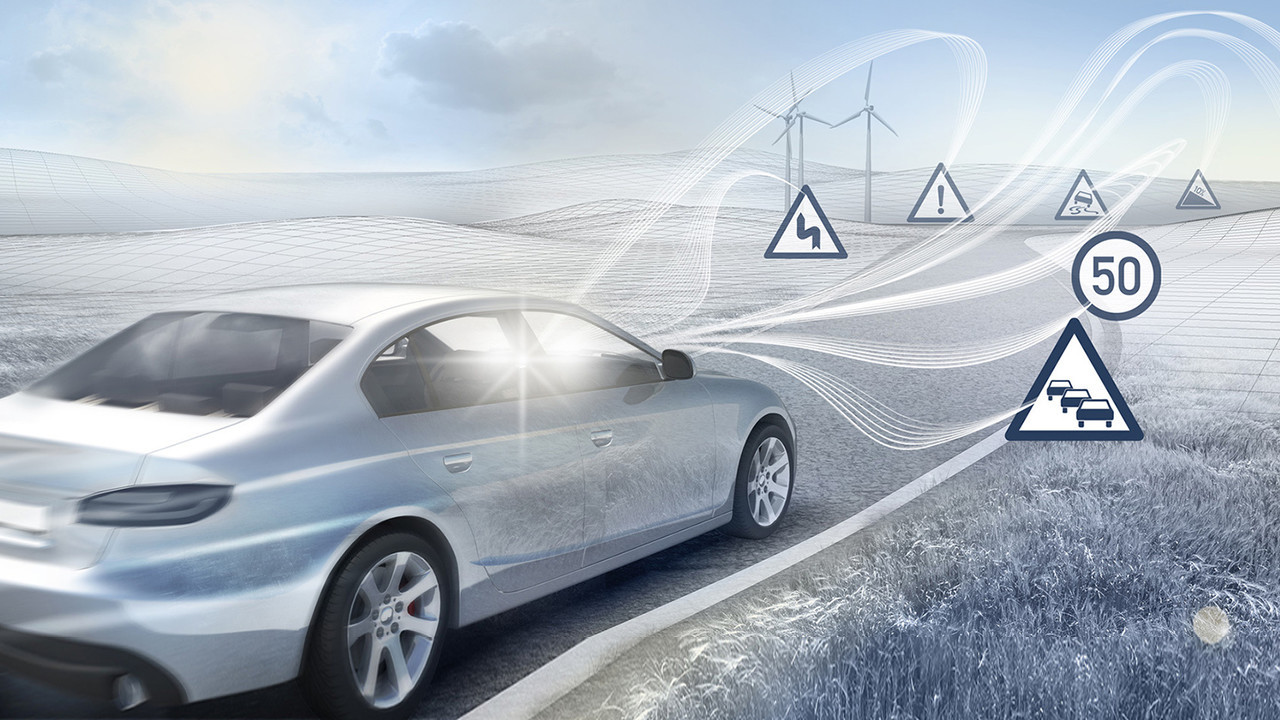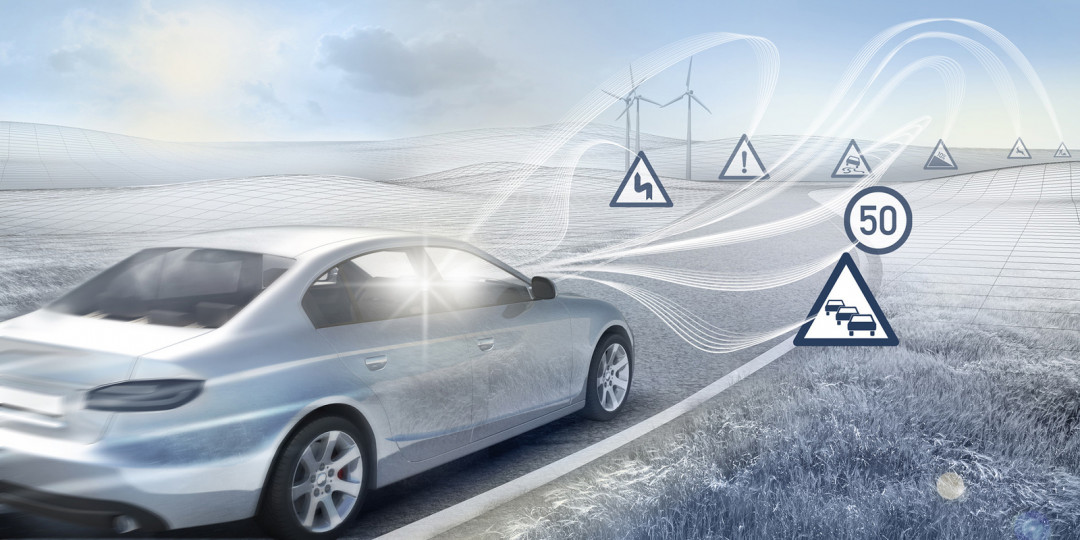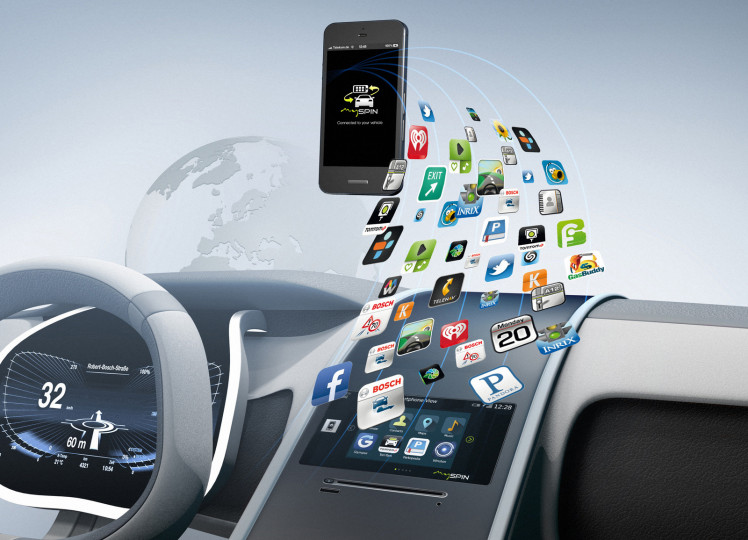After a long drive on the highway comes a moment of sudden fear: a traffic jam behind the next curve. Once you’ve reached your destination later on, there’s no parking anywhere in sight. These days, this is everyday life behind the wheel. In fewer than ten years though, there will be completely new possibilities: highly automated driving will ensure relaxed highway travel, cars driving ahead will send advanced warning of slowing traffic, and your own vehicle will ease off the gas before a dangerous situation can arise. At the end of a journey, navigational devices will guide the driver directly to a free parking area or the car will even find its way through the parking garage completely independently.
With the integration of cars into the Internet, this vision is not science fiction but becoming reality. The study “Connected Car Effect 2025” by Bosch and the consulting firm Prognos investigated more closely what this trend will mean specifically for the US, Germany and the major cities of China. The result: safety systems and cloud-based functions can prevent around 260,000 injury accidents, save 390,000 tons of CO2 emissions and offer drivers many hours of more time for other activities. “Connected mobility will mean fewer accidents, less fuel consumption, less stress,” says Dr. Dirk Hoheisel, member of the Bosch board of management, summarizing the results of the model calculations.
Known assistance and safety systems will become data sources
“The hidden heroes of the connected revolution are assistance and comfort systems, which we are often already familiar with,” says Hoheisel. According to the model calculations, the Electronic Stability Program (ESP), for example, will be available in up to 90% of all vehicles in the three countries covered by the study by 2025, with sensor-based automatic emergency braking and lane assists in up to 40 percent of the car fleet. Systems for more comfort and connectivity will also be found in the majority of cars: in 2025, smartphones will be integrated into approximately every other vehicle’s infotainment system.
The increasing number of such systems and their increasing connection to the Internet make them far more than the sum of their parts – for everyone involved. ESP sensors will report upcoming sections of icy road, cameras will collect data on speed restrictions and fog, functions such as Internet-based parking solutions and wrong-way driver warnings in virtually real-time will be in widespread use.
Individual findings from the study “Connected Car Effect 2025”
“Our study shows that the effects of connectivity will have a perceptible impact on every driver in 2025,” says Hoheisel. For the study, Bosch and Prognos have produced calculations for the US, China and Germany. Here is a selection of the individual findings:
- Over 260,000 accidents involving personal injuries (US: 210,000, China: 20,000, Germany: 30,000) will be avoided annually – as many accidents as occur within two years in Germany’s capital city of Berlin.
- 360,000 fewer people injured by traffic accidents – the same as 12 years without traffic injuries in Los Angeles. In the US alone, there will be 290,000 fewer (China: 25,000, Germany: 37,000).
- About 11,000 people could be saved through connected assistance systems, 4,000 of whom in the US (China: 7,000, Germany: 300).
- Up to EUR 4.3 billion in material and damage costs will be saved by connected assistance systems. This is nearly double the sum spent by the Chinese government in 2016 to improve air quality in Beijing. These sums mean considerable savings for insurance companies, keeping a little more money in the purse or wallet of every individual vehicle owner. Of the EUR 3.6 billion attributable to US’s savings (China: EUR 380 million, Germany EUR 450 million), smartphone integration alone will contribute over EUR 610 million.
- Around 400,000 tons of CO2 will be spared thanks to connected mobility functions – as much as the Black Forest national park in Germany can process in three years. Concepts such as community-based parking and active parking lot management will reduce parking traffic by up to 380 million kilometers, while highly automated driving saves additional fuel.
- Approx. 70 million driving hours will be shed by connected parking functions in the US, China and Germany. That is as many hours as 40,000 employees work in a year.
- 31 hours of free time on the highway: US citizens spend 43 hours per year on interstates (China: 26 hours on expressways, Germany: 39.5 hours on highways). Highly automated driving and simultaneous Internet connection will make free around 80 percent of time behind the wheel to be used for something other than driving: reading, emails, video conferencing, films, for example. Frequent drivers who reach 40,000 kilometers of driving a year could benefit from 95 extra hours of productivity during their journeys.
Bosch is the driver of connected mobility
There is hardly another company with as much drive toward connected mobility as Bosch. The technology and service company is developing the necessary connectivity technologies, sensors, and cloud solutions. Its portfolio also extends to a variety of different services through intuitive display and operating concepts.
Investigative methodology
Bosch and Prognos assessed a total of eleven technologies for private passenger transport, particularly their dispersion and impacts by 2025 in the US, Germany, and metropolitan areas in China. “In model calculations, we simulated the speed at which the new technologies would be adopted into the vehicle fleet,” explains Prognos mobility expert Stephan Kritzinger. The model is based on international statistics on vehicle inventories, accident data and current research, as well as estimates by Bosch and Prognos.
Since 1959, Prognos has been advising decision-makers across Europe from politics, business and society on questions about the future. Grounded in neutral analyses and well-founded forecasts, experts in Basel, Berlin, Bremen, Brussels, Düsseldorf, Freiburg, Munich and Stuttgart develop practical decision-making grounds and future strategies for companies, contracting authorities and international organizations.
Mónika Hack
+36 70 510 5516
EXPERIENCE BOSCH AT CES 2017: Thursday to Sunday, January 5-8, 2017 at Central Hall, booth #14128
FOLLOW Bosch’s CES 2017 Highlights on Twitter: #BoschCES
PANELS WITH BOSCH ESPERTS:
Thursday, January 5, 2017; 11:30 am to 12:30 pm (local time): Conference track “MEMS & Sensors: Personalizing Consumer Technology”, Session “Where are Consumer Electronics Taking the Sensors Industry?” with Dr. Stefan Finkbeiner, CEO and General Manager, Bosch Sensortec; Venetian, Level 4, Marcello 4501
Friday, January 6, 15:30 pm to 4:30 pm (local time): Conference track “Vehicle Technology”; Session “Redefining the Automotive Infotainment Experience” with Mr. Torsten Mlasko, Las Vegas Convention Center N258
Mobility Solutions is the largest Bosch Group business sector. In 2015, its sales came to 41.7 billion euros, or 59 percent of total group sales. This makes the Bosch Group one of the leading automotive suppliers. The Mobility Solutions business sector
combines the group’s
expertise in three mobility domains – automation, electrification, and connectivity – and offers its customers integrated mobility solutions. Its main areas of activity are injection technology and powertrain peripherals
for internal-combustion engines, diverse solutions for powertrain electrification, vehicle safety systems, driver-assistance and automated functions, technology for user-friendly infotainment as well as vehicle-to-vehicle and vehicle-to-infrastructure
communication, repair-shop concepts, and technology and services for the automotive aftermarket. Bosch is synonymous with important automotive innovations, such as electronic engine management, the ESP anti-skid system, and common-rail diesel technology.
The Bosch Group is a leading global supplier of technology and services. It employs roughly 375,000 associates worldwide (as of December 31, 2015). The company generated sales of 70.6 billion euros in 2015. Its operations are divided into four business
sectors: Mobility Solutions, Industrial Technology, Consumer Goods, and Energy and Building Technology.
The Bosch Group comprises Robert Bosch GmbH and its roughly 440 subsidiaries and regional companies in some 60 countries. Including sales
and service partners, Bosch’s global manufacturing and sales network covers some 150 countries. The basis for the company’s future growth is its innovative strength. Bosch employs 55,800 associates in research and development at 118 locations across
the globe. The Bosch Group’s strategic objective is to deliver innovations for a connected life. Bosch improves quality of life worldwide with products and services that are innovative and spark enthusiasm. In short, Bosch creates technology that is
“Invented for life.”
Additional information is available online at www.bosch.com, www.bosch-press.com, twitter.com/BoschPresse





